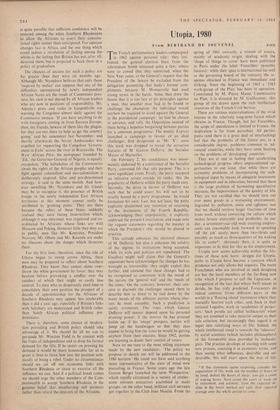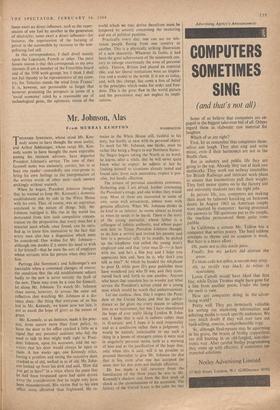Utopia, 1980
From BERTRAND DE JOUVENEL PARIS MHE French parliamentary leaders campaigned 1 in 1962 against personal rule: they lost. Indeed, the general election blast from the referendum bomb unseated quite a few; others were so cowed that they submitted, when the New Year came, to the General's request that the President of the Senate be excluded from the delegation presenting that body's formal com- pliments, because M. Monnervi.11e had used strong terms in the battle. Some then drew the lesson that 'it is too late to pit principles against a man, that another man had to be found to challenge the champion. An individual would anyhow be required to stand against the General in the presidential campaign: let him be chosen in advance, and rally the Opposition instead of there being a hopeless bargaining between parties for a common programme. The weekly Express launched a campaign in favour of an ideal challenger, first designated as 'Mr. X': soon this mask was dropped to reveal the attractive features of M. Gaston Defferre, the Socialist Mayor of Marseilles.
On February. 2, his candidature was unani- mously endorsed by a conference of the Socialist .Party, convened fdr that sole purpose. This is a most significant event. Firstly. the party accepted an initiative arisen outside its ranks; this the popularity of Defferre within the party made easy. Secondly, the drive in favour of Defferre was such that he could assert his will not to be straitly bound by a party programme: he would formulate his own. Last, but not least, the party explicitly, disclaimed any intention of returning to the institutions of the Fourth Republic; acknowledging their unpopularity, it explicitly endorsed the present Constitution, and made only the vaguest statements regarding the manner in which ;the President's role should be altered in practice.
This attitude enhances the electoral chances of M. Defferre; but also it enhances the solidity Of the regime, its institutions being accepted, while its style and policies are repudiated. The Gaullists might well claim that the General's opponents have acknowledged the changes he has wrought as irreversible; they might exploit this further, and contend that these changes had to be recognised as consonant with the mood of the nation, the 'general will' and the 'needs of the times.' On the contrary, however, their con- cern to discredit the challenger caused them to describe him as fated to be tied down by the many bonds of the different parties whose elec- tors he must assemble. Such a prediction is surely erroneous. The votes which Gaston Defferre will muster depend upon his personal drawing power; if the interest he has aroused builds up. if his 'image" prospers, parties will jump on the bandwagon so that they may appear to bring him the votes he would be getting anyhow from their electors. Since 1962, parties are learning to doubt their control of voters.
Now let me turn to the most telling statement made by the new candidate: 'The policy we propose to sketch out will be addressed to the 1980 horizon.' He could not have said anything more representative of the state .of mind now prevailing in France. Some years ago the late Gaston Berger launched the term 'Prospective,' which rapidly circulated in a variety of circles: some eminent executives assembled in study groups; on the other hand, brilliant civil servants got together in the Club Jean Moulin, From the spring of 1961 onwards, a stream of essays, mainly of academic origin, dealing with the 'shape of things to come' have been published in Paris under the label 'Futuribles' (possible
futures): while their span is international (as well as the governing board of the venture), the re-
sponse obtained in France was immediate and striking. Since the beginning of 1963 a '1985 work-group of the Plan' has been in operation.
Constituted by M. Pierre Masse, Commissaire au Plan, it, is directed by M. Guillaumat: this group of ten draws upon the rich intellectual resources of the French Civil Service.
These are various materialisations of the vivid interest in the relatively long-term future which obtains in France. Though, but for Futuribles, the scope of speculation is limited to France. the inspiration is far from parochial. All partici- pants (and there is a great deal of interlocking) feel that the problems of the future are, to a considerable degree, problems common to 'ad- vanced' countries, while they have some bearing on the problems of 'developing' countries.
They are at one in feeling that accelerating technological progress offers unprecedented op- portunities to our kind: that while there are economic problems of incorporating the tech- nological input by means of adequate. investment in equipment and in education, beyond that there is the large problem of harnessing quantitative increase, the improvement of the quality of life.
They are not satisfied that we should turn out ever more goods in a worsening environment, degraded by pollution, noise and ugliness; nor that we should retrieve larger fractions of time from work without conveying the culture which makes leisure enjoyable and profitable. In our
day, a seventeen-year-old, male entering employ- ment can reasonably .Iook forward to spending
'off the job' surely more than two-thirds and possibly as much as three-quarters of his waking life to come* : obviously then, it is quite as
important to fit him for this as for employment. Utopia now seems achievable within the life-
times of those now born: designs for Utopia. paths to Utopia have become a concern which prudence not only allows but requires. The many Frenchmen who are involved in such designing are but the local members of the far-flung new tribe which I propose to call the Laputians, in recognition of the fact that where Swift meant to deride, he has truly predicted. Forecasters do indeed convene (from different parts of the world) in a 'floating island' (seminars) where they mutually hearten each other,, and, back in their national Lagados, work in 'academies of projec- tors.' Such people are called 'technocrats' when they are assumed to take material output as their sole criterion, but increasingly they regard it as input into satisfying ways of life. Indeed, the whole intellectual trend is towards the 'takeover' by social scientists (which includes philosophers) of the foreseeable data provided by technolo- gists. The practice develops of starting with some new process. assessing it in economic terms, and then seeing what influences, desirable and un- desirable, this will exert upon the way of life.
" If this statement seems surprising. consider the expectation of life, v.ork out the number of hours to be lived, deduct the hours of sleep: you get a count of waking hours. Next count the years of work tip to retirement. and estimate. from the eweeted de- cline in the hours worked per year. their :\pcelcd average over the whole period to come.
Some exert no direct influence, such as the super- session of one fuel by another in the generation of electricity; some exert a direct influence—for instance, the supersession of the burning of petrol in the automobile by recourse to the non- polluting fuel cell.
In this correspondence, I shall dwell mainly upon the Laputians, French or other. The most honest reason is that this corresponds to my own interests (I am a member of the Futuribles board and of the 1958 work-group), but I think I shall not fail thereby to be representative of my coun- try, for `futurists stands the wind from France.' It is, however, not permissible to forget that however promising the prospects in terms of a `social economy' ruled by a reasonable use of technological gains, the optimistic vision of the world which we may derive therefrom must, be tempered by anxiety concerning the mustering and use of political passions.
Practically every day, one can see on tele- vision people fleeing from one country or another. This is a physically striking illustration of a new insecurity. Whatever its faults, it had been the great achievement of the nineteenth cen- tury to enlarge enormously the zone of personal safety. Therein, Britain had played an essential role, and her liberal institutions were an inspira- tion and a model to the world. It is not so today, and, with this change, has come a loss of belief in the principles which make for order and free- dom. This is the great flaw in the world picture and the previsionist may not neglect its impli- Ca tions.



































 Previous page
Previous page